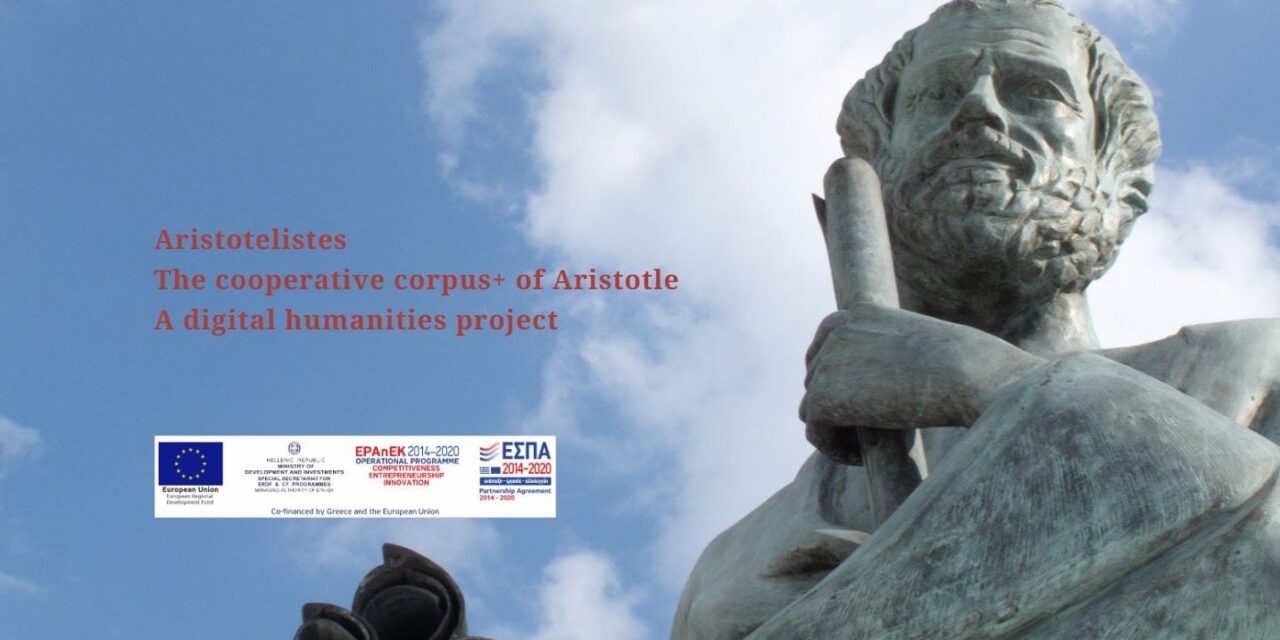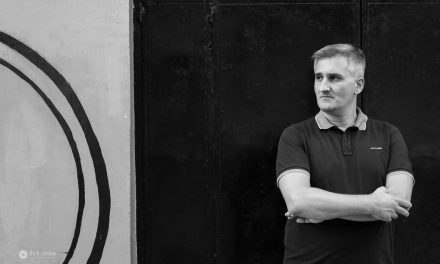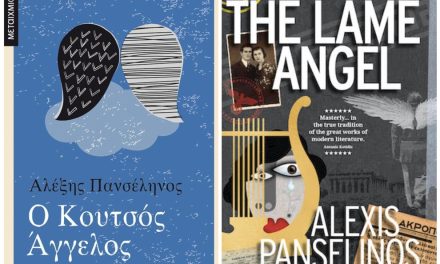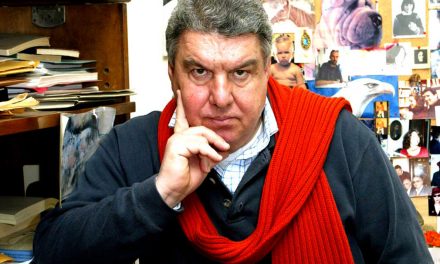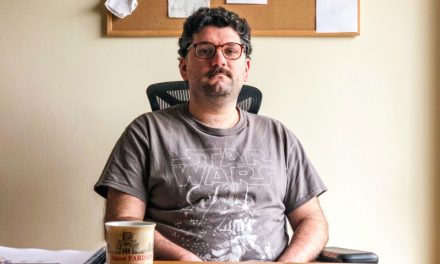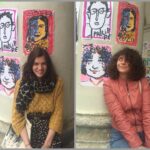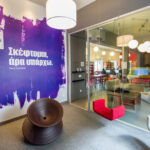“Aristotelistes” project has been running since 2020 aiming to the development, demonstration, assessment and operation of an integrated and inclusive open platform containing the complete corpus of Aristotelian works. The value of the project lies on its novel approach to the study of a classical corpus. The project fully adopts and builds on the open innovation paradigm with considerable added value contributed by Greek academia and research institutes.
This platform will operate as a social cooperative network, in which diverse types of users (academics, scholars, general public, students, and educational staff) will be able not only to navigate through its content, but also to contribute creatively towards its enhancement. The project will crucially contribute to the development of a sustainable open innovation environment in the field of culture, which meaningfully incorporates collective intelligence.
Among the partners of the project are: the Aristotle University of Thessaloniki, an internationally renowned research institution; Nissos publications which have been active since 1992 in the fields of social sciences and humanities; the Society for the Study of Human Sciences, a non-profit scientific organization and officially recognized NGO by the Ministry of Foreign Affairs; the Social Cooperative Enterprise ACTION PLUS which since 2014 designs and implements cultural mediation projects; and the Computer Technology Institute and Press “Diophantus”, a research and technology organization focusing on research and development in Information and Communication Technologies (ICT).
Reading Greece* spoke to the project’s scientific manager, Professor Vassilis Kalfas (Aristotle University of Thessaloniki) and the translation coordinator, Professor Gerassimos Kouzelis (National and Kapodistrian University of Athens), about the scope and main objectives of the project, the challenges they have faced so far and the prospects ahead.
Aristotelistes project has been running since 2020 aiming to the development, demonstration, assessment and operation of an integrated and inclusive open platform containing the complete corpus of Aristotelian works. Tell us about the scope and main objectives of the project.
Our aim is to gather all the essential information related to Aristotle’s work in an easy-to-use and functional database, adapted to a modern way of information and learning. The platform includes the ancient text of all Aristotelian works, new modern Greek translations, interpretative notes on the translation, indexed comments of the ancient Greek commentators and a part of modern research. It also includes a complete dictionary (a small encyclopedia) of the concepts, works and names that appear in the Aristotelian texts. The material has been organized and interconnected with the means offered by modern digital technology to make it accessible and easy to use. A large team of academics and technicians worked to gather the material and create the database.
The platform is addressed both to a specialized audience of researchers and students, who will find integrated and properly archived information, corresponding to a multitude of printed and partly hard-to-find books, as well as to interested readers, teachers and students, who want to have a first contact or to become familiar with some aspect of Aristotle’s thought.
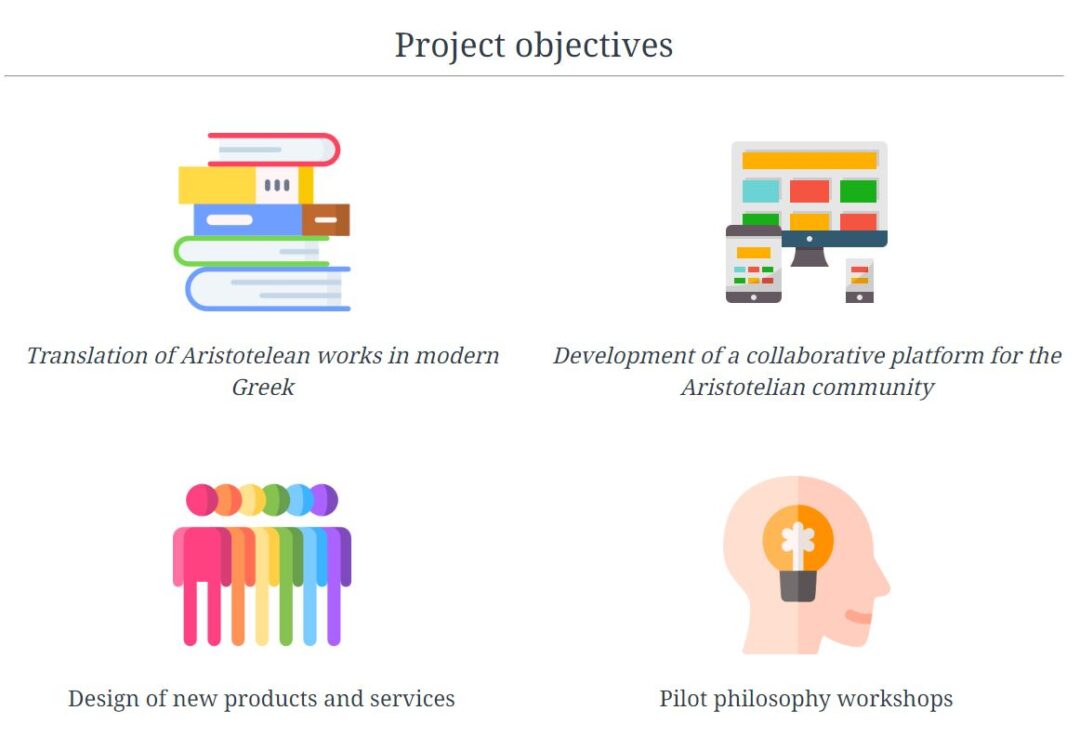
The platform aspires to operate as a social cooperative network, encouraging users not only to navigate through its content but to also contribute creatively towards its enhancement. How is this interaction to operate?
The main innovation of the platform is its open and interactive nature. The advantage of digitally organized material over the corresponding printed material is that it is not fixed and definitive. It can be continuously enriched, modified and corrected. In this sense, its form is attuned to the way research itself evolves. History shows that the accepted interpretations of Aristotle’s work went through multiple levels of review and approval, since the assimilation of Aristotle’s thought was decisive for important cultures, such as the Byzantine, the Arab, the medieval and the modern European. The same applies to the accepted translations of the Aristotelian work, which also change, since translation is by definition a form of interpretation. The platform therefore enables each registered user to propose additions, corrections and new solutions to each section of the material. Proposals are submitted through the forum corresponding to each section, judged by experts and, if accepted, integrated into the platform.
Within the scope of the project, there have been created a number of projects, e.g. educational-periegetic workshops, translation-reception workshops. Could you elaborate on these initiatives?
The project’s innovative character lies not only in the wealth and potential that the platform offers its users, but mainly in the way in which the Aristotelian work has been rendered in Modern Greek in a contemporary, functional way. At the core of this venture is a special translation workshop that has a history of 15 years.
Alongside this workshop which has become an institution, the project has also incorporated some others. The first among them is a workshop that focuses on the reception of Aristotelian works, within the framework of which there are discussed the crucial moments of this century-long dialogue on the Aristotelian philosophy. The seminars that have taken place so far referred to Poetics, aspects of the work as well as exemplary interpretations and commentaries by later philosophers. At the same time, a pilot workshop of interactive and online translation and editing was launched, which we aspire that it becomes a real tool for those who want to work as translators, editors or researchers.
The educational workshops, which are already in operation, are addressed to teachers and students as well as anyone else interested, offering material and a framework for discussion related, on the one hand, to themes drawn from the work of Aristotle and, on the other hand, information and knowledge related to school subjects, mainly Highschool. The former include, for example, workshops on friendship, injustice, bliss, imagination or time, while the latter workshops on, for instance, Athenian democracy, Aristotelian astronomy or rhetoric. Some of the educational workshops include organized tours to archaeological sites depending on their subject. There has always been a great interest in tours of this kind, especially in Athens, and citizens of all ages and professions can take part in the respective activities.
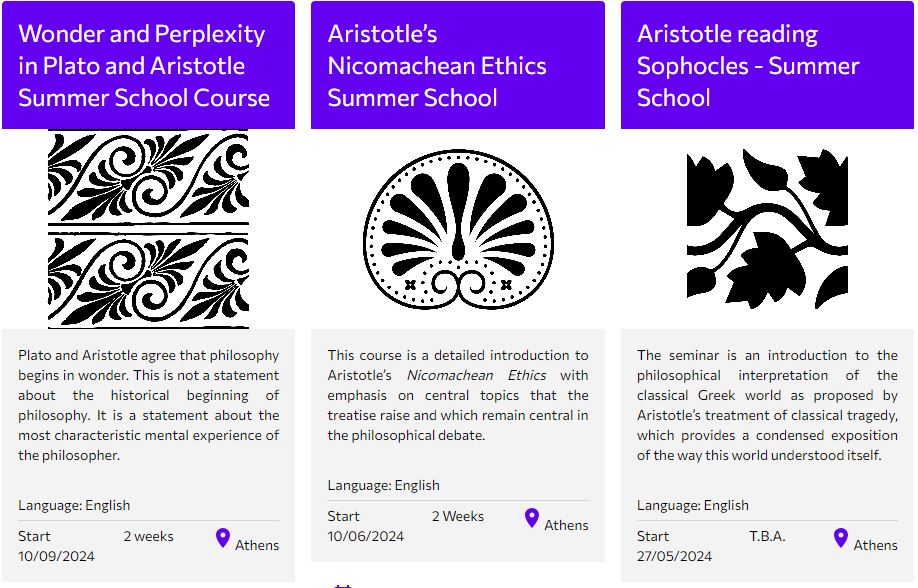
Three summer schools have been scheduled to take place in 2024. Tell us a few things about their content and the people they are addressed to?
The “summer schools” are primarily addressed to undergraduate and postgraduate students, mainly from abroad; for this reason, at least the first ones, are designed in English. There is great international interest in ancient Greek literature, mostly philosophy. And the work of Aristotle comes first as an inexhaustible source of ideas and influences in all subsequent philosophical research. For this reason, the demand for courses held in its “cradle” can be high. After all, visiting Greece is also a strong motivation. Thanks to an extremely wide network of very high-level academic partners, we can offer seminars, lectures and laboratories that may be of interest to young researchers from various foreign universities. We have already come to an agreement for a future cooperation with some of them.
The first summer schools focus on three of the most important themes associated with the Aristotelian work: the ethics of the virtues of character as developed in the pivotal work Nicomachean Ethics; the wonder and perplexity involved in philosophy as a personal experience, discussed both by Plato and Aristotle; and the philosophical interpretation of the classical Greek world as proposed by Aristotle’s treatment of classical tragedy, on Poetics as on Sophocles’ Oedipus Rex. The first three “summer schools”, coordinated by Charilaos Platanakis, Spyridon Rangos and Dimitris Karydas, include visits to archaeological sites, laboratory meetings, assessment procedures and research work, while offering ECTS credits.
Which have been the main challenges you have been faced with so far and what is to be expected from the project in the future?
The major difficulty we have faced so far was coordinating the people who worked to complete the project, since 5 different institutions (2 public and 3 private) were involved, and a total of over 60 researchers and technicians. It was also important to meet the timetables we set, so that the project could be completed within the stipulated three-year period.
At the present moment the most important thing is to make the existence of the platform known to all those interested and to encourage their registration (which is free for the time being), their use and their active participation. Therefore, we should take advantage of all the channels for the dissemination of information, whether it is the social media, the press or the information of specific groups, such as teachers and students.
In the future, among the major challenges will be, on the one hand, ensuring the seamless operation of the platform and, on the other hand, its enrichment. The operation of the platform requires the existence of a permanent server and a small number of specialized employees – therefore it requires that it be hosted in a prestigious institution, either public or private. As for its enrichment, it will depend on the active participation of the public and experts. Building all the digital material upon the ancient text of Aristotle, which has an international character by nature, theoretically offers the possibility to develop the platform in other languages besides Modern Greek. It is important to underline that at the moment there is no such project dedicated to Aristotle at an international level – the platform is therefore clearly innovative.
*Interview by Athina Rossoglou
TAGS: CULTURE | HERITAGE | LITERATURE & BOOKS | READING GREECE

